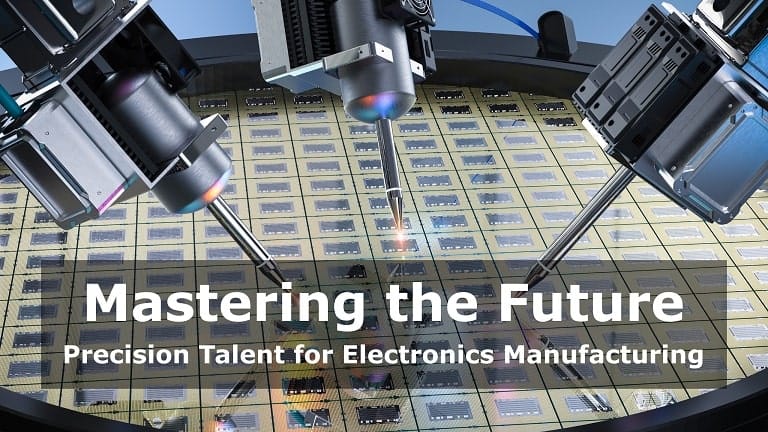- Why Talent is the Competitive Edge in Electronics Manufacturing
- The Pressure of Miniaturization and Product Lifecycles
- The Precision Demands of SMT: Talent for Complex Lines and Testing
- Global Supply Chains Demand Global Leaders
- What to Look for in Electronics Manufacturing Recruiters
- How Manufacturers Can Collaborate Effectively with Recruiters
- Emerging Skills and Future Trends in Electronics Manufacturing Talent
- Frequently Asked Questions (FAQ)
- Conclusion
The relentless evolution of electronics, marked by miniaturization and increasing complexity, has created an unprecedented demand for specialized talent in manufacturing. In this hyper-competitive landscape, finding the right expertise is no longer just an HR function—it’s a critical business imperative. Behind every high-speed production line and every breakthrough device lies a team of experts who ensure that innovation doesn’t falter at the factory floor.
From managing precision-heavy Surface-Mount Technology (SMT) lines to navigating unpredictable global supply chains, the electronics manufacturing sector is defined by speed, accuracy, and constant change. But success in this fast-moving environment hinges on a less visible but equally vital component: people. The right talent fuels growth, minimizes downtime, and ensures your competitive edge. In this article, we explore how specialized electronics manufacturing recruiters help companies stay ahead by finding professionals with the precision, agility, and innovation mindset the industry demands.
Why Talent is the Competitive Edge in Electronics Manufacturing
![]()
In electronics manufacturing, where speed, precision, and adaptability define success, talent is more than a resource—it’s a strategic advantage. The industry’s increasing reliance on complex technologies like Surface-Mount Technology (SMT), miniaturization, and high-throughput automated testing means that even a small skills gap can disrupt entire production lines. In this high-stakes environment, a single mis-hire can lead to costly delays, production rework, and even product recalls, with some sources indicating the cost of a bad hire can be as high as 30% of an employee’s first-year salary. Indeed, finding such highly specialized professionals is a formidable challenge; for instance, the Semiconductor Industry Association (SIA) projects that upwards of 70,000 jobs (or 58% of approximately 115,000 jobs the U.S. semiconductor industry will add by 2030) will go unfilled, including 27,300 engineers and 26,400 technicians.
The demands are higher than ever. Shortened product life cycles, just-in-time production, and rising quality standards leave no room for inefficiencies. Companies need engineers who can optimize processes on the fly, technicians who can troubleshoot precision machinery, and team leads who can manage output without compromising quality. But finding such highly specialized professionals is easier said than done.
That’s where electronics manufacturing recruiters become essential. These recruiters go beyond job descriptions—they understand the technology, the workflows, and the soft skills needed to thrive on the manufacturing floor. Whether sourcing an SMT process engineer, a quality control manager, or a production supervisor, they know how to identify candidates who can step in and deliver impact from day one.
In an industry where every second counts and every micron matters, having the right people in the right roles is critical. Talent doesn’t just support innovation—it drives it. And when sourced strategically, it becomes the cornerstone of a resilient, future-ready manufacturing operation.
The Pressure of Miniaturization and Product Lifecycles
The industry’s drive toward miniaturization and shortened product lifecycles is not just a technological challenge—it’s a human resource one. Smaller, more powerful devices require greater assembly precision, while faster market expectations demand quick retooling and iteration.
For manufacturers, this means not only embracing agile production processes but also cultivating a workforce that can operate with flexibility and speed. Upskilling internal candidates in rapid prototyping, collaborative design thinking, and lean manufacturing can create stronger internal pipelines. At the same time, new talent must be brought in to fill gaps and add fresh expertise.
Electronics manufacturing recruiters are uniquely positioned to identify individuals who thrive in these high-pressure, constantly evolving environments. They focus on professionals who understand accelerated NPI (New Product Introduction) cycles, are familiar with rapid tooling adjustments, and can interpret product design changes with minimal supervision. These hires aren’t just workers—they’re enablers of transformation.
The Precision Demands of SMT: Talent for Complex Lines and Testing

Surface-Mount Technology (SMT) is the backbone of modern electronics manufacturing. Managing high-volume SMT lines demands precision, consistency, and in-depth understanding of equipment like pick-and-place machines, reflow ovens, stencil printers, and automated optical inspection systems. Even the smallest deviation—such as in solder volume or component orientation—can result in critical defects.
The challenge for manufacturers is twofold: maintaining quality while scaling production. Internal leaders must be both technically proficient and operationally efficient, capable of executing lean manufacturing principles while reducing downtime. Training staff in Six Sigma or IPC-A-610 standards is a valuable internal strategy. Still, it rarely eliminates the need for external hiring.
This is where electronics manufacturing recruiters become crucial. They assess candidates beyond just certifications. They dig into practical experience, such as resolving tombstoning issues, optimizing solder paste profiles, or implementing inline testing solutions. They also evaluate leadership qualities and adaptability—ensuring that candidates are prepared not only to run SMT lines, but to continuously improve them.
Global Supply Chains Demand Global Leaders
In the electronics manufacturing industry, supply chains are no longer linear—they are vast, interconnected webs stretching across continents. From sourcing semiconductors in Taiwan to assembling printed circuit boards in Eastern Europe and shipping finished goods to North America, the complexity of this global operation leaves manufacturers increasingly vulnerable to disruption. Delays in one region can halt production across the world.
According to a McKinsey report on global supply chain resilience, companies can expect production disruptions lasting a month or longer every 3.7 years, on average. This stark reality underscores the urgency of investing in supply chain leadership that is both strategic and globally aware.
To succeed in this volatile environment, companies must hire leaders with global supply chain expertise—professionals who understand not just logistics, but strategy. These individuals must be well-versed in international compliance (such as ITAR, REACH, and RoHS), skilled in negotiating with multilingual suppliers, and experienced in mitigating geopolitical and environmental risks. More importantly, they must be agile—capable of redesigning sourcing strategies or rerouting shipments in response to rapidly changing conditions.
Finding such specialized talent is no easy task. This is where electronics manufacturing recruiters with a global reach add immense value. These recruiters tap into international talent pools and understand how to assess both technical expertise and cross-cultural competencies. Whether sourcing a regional supply chain director or a global logistics strategist, they focus on candidates who have succeeded in fast-paced, high-volume manufacturing environments and who can align with your company’s operational and cultural goals.
What to Look for in Electronics Manufacturing Recruiters
Not all recruiters are equipped to deliver in this high-stakes environment. Manufacturers should look for recruiting partners who act not just as vendors, but as strategic collaborators.
Key qualities to look for include:
Industry Expertise: A recruiter should understand SMT, PCB assembly, testing protocols, and cleanroom standards.
Technical Acumen: They must grasp the nuances of roles like test engineers, manufacturing process engineers, or NPI leads.
Access to Passive Talent: The best candidates are often employed—and invisible to public job boards. A seasoned recruiter’s established relationships and insider access to top professionals who are open to the right opportunity but aren’t actively seeking roles is invaluable, providing access to a hidden talent pool.
Proven Track Record: Look for a history of successful placements in technical, mid-level, and executive roles.
Forward Insight: Good recruiters advise you on trends, salary benchmarks, and emerging roles in the industry.
A recruiter who checks these boxes becomes more than a hiring partner—they become an extension of your HR and operations strategy.
How Manufacturers Can Collaborate Effectively with Recruiters
To maximize the value of recruitment partnerships, manufacturers must treat recruiters as strategic allies, not transactional service providers.
Start by clearly defining the technical and cultural requirements for each open role. Share internal organizational charts, production objectives, and even pain points. The more context recruiters have, the better they can target and vet candidates.
Involve internal leaders—such as line supervisors, quality heads, or supply chain directors—in interview stages to ensure alignment between operational expectations and hiring decisions. Their real-world input helps refine the candidate pool early in the process.
Regular check-ins, timely feedback, and open communication allow recruiters to adapt their search quickly. When both sides operate with transparency and urgency, the results are stronger: faster placements, better fit, and higher retention.
Emerging Skills and Future Trends in Electronics Manufacturing Talent

The next generation of electronics manufacturing will be defined by automation, AI, data integration, and sustainability. Smart factories are becoming a reality, powered by IoT-connected machines, real-time analytics, and predictive maintenance.
This transformation is creating demand for new types of professionals, including:
Robotics Integration Engineers
Data Analysts for Manufacturing Systems
Sustainability Officers and Green Compliance Specialists
Cybersecurity Experts for OT (Operational Technology)
MES (Manufacturing Execution System) Developers
Manufacturers should begin investing in training current staff in these areas—particularly in digital twins, AI/ML tools, and energy-efficient process design. In parallel, recruiters must adjust their search strategies to source this next wave of talent.
Electronics manufacturing recruiters who stay informed on these trends offer more than hiring help—they offer future-proofing. They can guide clients in identifying skill gaps and even help shape job descriptions for roles that didn’t exist just five years ago.
Frequently Asked Questions (FAQ)
What is electronics manufacturing recruitment?
It refers to the process of hiring professionals specifically for roles in the electronics manufacturing sector—such as SMT engineers, test technicians, supply chain managers, and plant leaders—who possess the technical expertise and industry experience necessary for high-precision, high-volume production.
Why use a specialized electronics manufacturing recruiter instead of a general recruiter?
Specialized recruiters understand the industry’s complex requirements and can identify candidates with the right mix of technical skills, compliance knowledge, and operational experience. This leads to faster, better-quality hires.
What roles are in high demand in electronics manufacturing?
Some of the most sought-after positions include SMT process engineers, NPI leads, quality assurance managers, global supply chain directors, robotics and automation specialists, and data-driven manufacturing analysts.
Conclusion
As electronics manufacturing continues to push technological boundaries, the race for talent has become a defining challenge—and a strategic priority. Whether it’s managing the complexity of SMT lines, adapting to shortened product cycles, or building resilience into global supply chains, the industry’s progress relies on finding the right people.
Partnering with experienced electronics manufacturing recruiters gives companies a critical edge. With industry insight, global networks, and a laser focus on precision hiring, these recruiters ensure that manufacturing operations don’t just keep up—they lead. In a sector where time, quality, and innovation are everything, the right hire is the first step to the next breakthrough.
At JRG Partners, we specialize in placing elite electronics manufacturing talent across SMT, testing, global operations, and future-forward disciplines. Let us help you power your next stage of growth—with people who drive performance.
In a sector where time, quality, and innovation are everything, the right hire is the first step to the next breakthrough.
If your hiring needs go beyond electronics and extend into broader manufacturing leadership, visit our Manufacturing Executive Recruiters page to discover how we support end-to-end talent strategy across the industrial sector.


